#Adventure Interactive Fiction Simulation
Explore tagged Tumblr posts
Text
The Twine Fishing Simulator!
A little over a year ago, I released my largest Twine project ever, the Twine Fishing Simulator. Explore a surreal, entirely text-and-audio-based world! Meet three unique anglers! Fight through the dreamlike fog... And most importantly. Catch LOTS of fish! Free to play 🐟🤑
#interactive fiction#twine#itch.io#choose your own adventure#science fiction#short story#video games#writing#fishing#fish#fishing simulator
41 notes
·
View notes
Text
Update! (Patreon version will be updated on 20th! (adding Snu snu time >:3)
The long awaited, and long worked on update is here! What's new?
1. A new character has been introduced right from the beginnig!
2. Depending on which character you choose, this new character has their own unique back story!
3. You can now burn Harag's house will all three characters!
4. Close to 130K words with multiple routes!
That's pretty much it!! Hope you guys enjoy! Before I go though, I'm looking for beta testers so dm me if you want to apply! (You'll not only gain early access to the game, but also early access to arts!)
#femboy dating simulator#tomboys#interactive fiction#Action#Adventure#comedy#Novel#if#hosted games#choice#choice of ganes
18 notes
·
View notes
Text
i think the near-extinction of people making fun, deep and/or unique interactive text-based browser games, projects and stories is catastrophic to the internet. i'm talking pre-itch.io era, nothing against it.
there are a lot of fun ones listed here and here but for the most part, they were made years ago and are now a dying breed. i get why. there's no money in it. factoring in the cost of web hosting and servers, it probably costs money. it's just sad that it's a dying art form.
anyway, here's some of my favorite browser-based interactive projects and games, if you're into that kind of thing. 90% of them are on the lists that i linked above.
A Better World - create an alternate history timeline
Alter Ego - abandonware birth-to-death life simulator game
Seedship - text-based game about colonizing a new planet
Sandboxels or ThisIsSand - free-falling sand physics games
Little Alchemy 2 - combine various elements to make new ones
Infinite Craft - kind of the same as Little Alchemy
ZenGM - simulate sports
Tamajoji - browser-based tamagotchi
IFDB - interactive fiction database (text adventure games)
Written Realms - more text adventure games with a user interface
The Cafe & Diner - mystery game
The New Campaign Trail - US presidential campaign game
Money Simulator - simulate financial decisions
Genesis - text-based adventure/fantasy game
Level 13 - text-based science fiction adventure game
Miniconomy - player driven economy game
Checkbox Olympics - games involving clicking checkboxes
BrantSteele.net - game show and Hunger Games simulators
Murder Games - fight to the death simulator by Orteil
Cookie Clicker - different but felt weird not including it. by Orteil.
if you're ever thinking about making a niche project that only a select number of individuals will be nerdy enough to enjoy, keep in mind i've been playing some of these games off and on for 20~ years (Alter Ego, for example). quite literally a lifetime of replayability.
100K notes
·
View notes
Text
Alternative Uses for the Eureka: Investigative Urban Fantasy Rulebook

To answer the question immediately: Yes!
Eureka: Investigative Urban Fantasy is obviously purpose-built for investigation, often but not always involving some degree of urban or modern fantasy, but there’s a few other things that, incidentally, it does really well.
The Intended Use
Eureka: Investigative Urban Fantasy is purpose-built for investigation. Not police investigation, more like “investigative reporter” investigation. No fancy (and overrated) forensics here, just going around town, talking to people, examining evidence with the naked eye, maybe taking photographs, etc., hopefully culminating in successfully blowing the whistle, rescuing the victims, preventing further harm, or some other positive outcome. Of course, the danger, and the emotional strain of brushing with danger, may say otherwise. There are official Eureka: Investigative Urban Fantasy adventure modules for this, and it also plays well with Call of Cthulhu and Delta Green adventure modules.
Also there might be a vampire on either side of this equation.
The other thing it’s purpose-built for is survival-horror, in the same vein as early Resident Evil. The PCs are trapped in some location with a scary monster, and they must evade this monster long enough to figure out how to escape or defeat it. This of course actually involves a lot of investigation, such as examining clues to figure out what the nature of the monster even is, and how to escape.
The rest of this post is stuff that Eureka: Investigative Urban Fantasy wasn’t purpose-built for but incidentally runs very well.
Heists
Heists involve scoping out a location, breaking in, and stealing something from inside without getting caught. This necessarily involves a lot of investigation, which is what Eureka: Investigative Urban Fantasy does best.
Scoping out the building, finding the flaws in its security systems, learning all there is to know about it to anticipate anything that could happen during the heist, that is all investigation.
Actually breaking into the building and getting out without getting caught utilizes the dame careful evasion mechanics as already mentioned in above. Hell, even in the course of normal investigative gameplay, PCs often break into places to snoop for evidence. Stealing a file from a police station is not that different from stealing the diamond from the museum.

(Did I mention that Eureka also has mechanics for tracking how much attention the PCs have attracted from the police and how close the police are to coming to arrest them? And also car and foot chase mechanics?)
Spies
For some reason this doesn’t immediately occur to people, but spies are investigators. Their job is information gathering, and so Eureka emulates spy fiction really well too, especially since it has good stealth mechanics and pretty robust interpersonal conversation mechanics to boot.
Regular default gameplay in Eureka already assumes that information gathering is what the PCs are going to be doing, often while trying to keep a low profile and not draw attention to the fact that they’re investigating. Give them a false identity and drop them in a hostile environment and bam, they’re spies. (This is something our own personal group has actually done before and it went great.)
Assassins
Sometimes spies kill people too after investigating things like their regular movements, security detail, etc.
(Did I mention that Eureka also has robust and realistic gun fighting mechanics as well?)
S.T.A.L.K.E.R.
This one is a bit out of left field, but it makes sense if you think about it. Fragile PCs, robust gun fighting mechanics that simulate realistic shootouts across long distances, robust mechanics for social interaction and handling how the PCs will react to seeing weird and dangerous shit, and investigation mechanics that encourage keeping a careful eye of for the smallest details. Eureka can do S.T.A.L.K.E.R. surprisingly well. Drop the PCs in an irradiated, lawless exclusion zone where they don’t know who they can trust, and task them with following up leads on a mysterious artefact, and paying careful attention once they find it so they can figure out how to take it without being killed by invisible anomalies.

#heist#hitman world of assassination#hitman#james bond#s.t.a.l.k.e.r.#resident evil#call of cthulhu#delta green#eureka: investigative urban fantasy#eureka#indie ttrpg#eureka ttrpg#rpg#ttrpg tumblr#ttrpg community#ttrpg#indie ttrpgs#tabletop rpg#ttrpgs#survival horror
112 notes
·
View notes
Note
5 games you wished more people would play? (blatantly fishing for recs lol)
ahaha, i am happy to provide!!!
Leap Year is a short and sweet (only around an hour to an hour and a half) take on a metroidvania platformer that DELIGHTED me when i picked it up on a whim recently. basically: you are a little guy who, if you jump and then fall from your entire height, immediately dies. you can only survive falling from less than the peak of your whole jump. as you go, you discover more and more conditions to this through gradually evolving level design that reveals more 'quirks' to your move set as you progress through the levels. fantastic short little puzzle platformer; i need to play the DLC! exquisitely designed levels.
Quarantine Circular by bithell (the Thomas Was Alone dev- who remembers that one) is shockingly underplayed. it's an interactive fiction game that is told through your conversation with an alien being held after first contact with them during a worldwide pandemic; you are one of a team of scientists tasked with studying them. short and sweet and very good sci fi.
80 Days is so goddamn good and every time I remember it's not actually a game everyone played i'm like. whaaaaat. how!!! it's an Interactive Fiction retelling of the titular novel through a specifically postcolonial lens that does fascinating stuff with the metatext of the book; it's incredibly well written and the concept of asking an IF player to actually manage and make decisions around the jouney adds a really fun level of tension to it. one of my fave IF games of all time in a beautiful little package. you can also get it on phones, and that's how I played it; excellent game to have in your pocket for train journeys etc.
Long Live The Queen is a 'raising sim' where you have to help a young princess survive until her coronation; it's a really fun little simulation game with a high level of difficulty (it made me tear my hair out) and a very fun conceit (everyone wants to kill you before you get crowned; please don't die before the coronation). really liked that one, was always surprised it didn't get more attention! great introduction to the 'raising sim' genre, imo.
Diaries Of A Spaceport Janitor is an 'anti-adventure' game. it's like one of those ~cozy life sim~ games except a lot more honest than most of those about what, exactly, a life spent doing menial tasks often actually looks like. you are a Janitor in a hub world that actual adventurers depart for quests tm from; you are making a living the best you can cleaning up after them and hoping, one day, to maybe escape. it's funny and strangely a little heartwrenching and really damn cool looking; both visual and audio design are great.
30 notes
·
View notes
Note
What would your favourite choice of the games interactive stories be? Would you have a favourite type? Romance, Fantasy etc. and did any of the inspire you with the ones you are currently writing? 😁
Oh boy! This is going to be a long answer, brace yourself lol
Let me start by saying that I have a degree in English literature (in fact, I'm going to do a PhD on it), so reading, in general, is one of the core activities of my life.
As for text adventures, even if not from Choice of Games Ltd., I'd like to mention a few inspirations: my passion first came from the original Choose Your Own Adventure series, and I still remember which numbers obsessed me as a child: Mountain Survival #28, The Dragons' Den #33, and more than any other, Space Patrol #22! (The latter may have also fueled my unhealthy obsession with Star Trek TOS, actually). For those unfamiliar with this fantastic book series, the genres of the three books I mentioned are, respectively, adventure, fantasy, and sci-fi. This gives you an idea of how varied my tastes are...
Later on, I discovered interactive fictions and text adventures. Dude, it was a dream come true. I started with Adventure ('76, never finished it, of course) and Zork ('79, never finished that either… of course. How damn hard were they?!). Then Mystery Mansion ('78), Castle Adventure ('82), and too many, many others. I'm a sucker for Sorcery! from inkle, and I deeply loved Magium (RIP Chris, you won't be forgotten). For my Italian-speaking friends, I also really enjoyed the Fra Tenebra e Abisso series (although its current status is unknown).
But back to CoG-related things. I've read a lot, and I'd probably be faster telling you what I didn't like! As you may have figured out by now, I don't have any particular genre preferences as long as a story is well-written, though horror-thriller stories usually grab my attention more easily.
Important note: I've read a lot of stories and, with a few exceptions, I liked most of them. To avoid writing a too-long list, here are the published stories that really impressed me:
A Crown of Sorcery and Steel,
A Midsummer Night's Choice,
Blood for Poppies,
Blood Moon,
Broadway: 1849,
Choice of the Cat,
Choice of the Vampire,
Donor,
Doomsday on Demand (1 and 2),
Gilded Rails,
Golden Rose: Book One,
Jazz Age,
Lies Under Ice,
Life of a Mercenary,
Life of a Space Force Captain,
MetaHuman Inc.,
Noblesse Oblige,
Paradox Factor,
The Evertree Saga (all four books),
Rent-a-Vice,
Revolution Diabolique,
Siege of Treboulain,
Tally Ho,
The Daily Blackmail,
The Dragon and the Djinn,
The Fernweh Saga: Book One,
The Fog Knows Your Name,
The Gray Painter,
The Grim and I,
The Ghost and the Golem,
The Lost Heir,
The Midnight Saga: The Monster,
The Parenting Simulator,
The Play's the Thing,
The Soul Stone War (1 and 2),
The War for the West,
Tudor Intrigue,
Vampire Regent,
Vampire: The Masquerade (all of them),
Way Walkers: University (1 and 2),
Welcome to Moreytown,
Werewolves: Haven Raising,
Zombie Exodus,
Zombie Exodus: Safe Haven.
And now, onto works in progress! There aren’t that many because I barely have time to follow my own (heh…), so here, in alphabetical order, are the ones I'm following with the most interest:
Adoriel's Tears (@adoriels-tears-if),
A Father's Love (@kal-down),
Crown of Ashes and Flames (@coeluvr),
Dawn Chorus (@dawnchorus-if)
Disenchanted (@disenchantedif),
Dragon's Edged (@dragonedged-if),
Elysium (@elysiumcircusif),
Fallen Lights (@fallenlightsif),
For King and Country (@forkingandcountry-if),
From The Ashes We Rise (@kal-down),
Hubris (@hubris-the-if-game),
Kingdoms and Empires (@kingdoms-and-empires),
Return to Misty Cove (@fluorescent-if),
The Abyssal Song (@ri-writes-if),
The Adventures of Sherlock Holmes - An affair of the heart (@doriana-gray-games),
The Lonely Shore (@thelonelyshore-if),
The King's Hound (@the-kingshound),
The Reaper Watches Me (@thereaperwatchesme),
The Bureau (@thebureau),
The Unseelie (@theunseelieif),
Van Helsing (@vanhelsing-if),
When Life Gives You Lemons (@when-life-gives-you-lemons-if).
Okay, that was… a lot. As for direct inspirations, I don't have any direct ones, but I can say I felt like writing a post-apocalyptic story after reading Doomsday on Demand! Other than that, I guess the collection of narrative, text adventures, and interactive fiction I've read have led me to where I am now.
Damn, it took me hours to write this answer. I hope it's satisfying at least! Thanks for asking ☺
#readers mail#After Dark#The In-Between#Hope Abides#if wip#interactive game#interactive fiction#choice of games#hosted games#choicescript#dashingdon#interactive novel#if game#cyoa#cyoa game#cyoa book#choose your own adventure#multiple endings#interactive story#romantic drama#love story#romance#romance novel#contemporary romance#choose your own story#horror#horror novel#apocalyptic world#apocalyptic horror#apocalyptic fiction
75 notes
·
View notes
Text
thinking about world-first design
My last three games were more or less centered on the character, and consequently the player. I think this is a completely valid way of playing, but having done three kinds of games that had this, I wanted to branch out into a world-first style of design.
World-first design are the ones I associate with the stylings of mostly OSR: where the gameworld and the modules and the adventures and the equipment, the counting of ammo, of resources, are all more important than creating a character in such a way to fulfill a particular fantasy or character concept.
I call this world-first rather than character-first because it puts into primacy the very world and fiction that the players must interact with rather than the player characters being only focus of such games. In the same way that character-first design (WotC D&D, Exalted, Lancer) doesn't inherently preclude an overwhelming focus on a world's lore and vibe, world-first design doesn't inherently preclude a focus on character building or a certain primacy of the player characters over NPCs. In World-First design, to be someone of note is to have played the game and interacted with the world long enough. However, a caveat of this world-first design is that it's very easy to die, to be extinguished (it is important, in a way, in World-First design to showcase the strength of the world and how it doesn't bend to the whims of a player).
The difference of course, is how the mechanics are mostly written and presented. In World-First design, there's not much use for metacurrencies that imply that the PCs are inherently different or privileged over other player characters. World-First PCs gain privilege from things within the gameworld. While diegesis is of value, it is not the be all end all, as long as the game focuses on mechanics of the world rather than of the player. Frex: ROMANCE OF THE LOTUS THRONE has a (very rare, D&D 4e Action Point-esque) reroll system known as DETERMINATION. However Determination is a very real thing in the game, and can be gained from succeeding in particular tasks, or interacting with community and finding some form of purpose. Its sublimated form of willpower. Its also a bit of an Undertale reference. The difference then is that Determination is not meta-currency: it's in-world currency. There's no Determination stat in the character sheet: it instead fills up an inventory slot. It's a mechanic of the world and not of the player. It's simulationism without the tax forms (rules-lite, fiction-first simulationism is a topic for another post).
When I play or run RPGs, my personal preference has always been that of immersionism. The deeper you sink into a world's physics, a world's customs, the more the Other becomes the Self is a point of great joy for me: whether that be the chilling borderlands of SYMBAROUM, the intricate Underworld of VAMPIRE, the ineffable Space Opera of FADING SUNS, or the crimson-gold otherworld of ARTESIA. World-First can be a genre emulation philosophy (frex, if your world is meant to emulate a genre, a la Exalted's Creation) but I believe that Genre Emulation is not the be-all end-all of Role-Playing Games, as some would think it to be. Mechanics aren't automatically good just because it hearkens to a particular genre, a la PbtA. I think mechanics are good when they accomplish the Design Goal of the game. And sometimes Design Goals are to simulate or fabricate an otherworld and transport you there. I think that goal is one of the more difficult ones to truly achieve, so any that attempt it to this day I hold in respect, even if they end up being rules-heavy simulation-esque attempts. I believe that World-First games are like, the immersive sims of TTRPGs (in the sense that they take some getting used to but create for some of the best emergent gameplay moments, as well as potent immersion of a world).
In ROMANCE OF THE LOTUS THRONE, I’ve managed to do a bit of a mixing. Inspired by the likes of Dark Souls and Elden Ring, where the world is important, but its the character builds that make or break a game, I’ve made the characters dependent on the world. This means you more or less start a game with a blank slate of a character, or someone with the bare minimum of detail. Then, as you play, you learn and gain abilities from milieu of the world, gaining items and powers and magicks from playing the game, rather than from a Class Table. In a way, this is also an inherent forcing of diegesis in the game, and diegesis is one of my favorite concepts in all game design, across all mediums.
This does (somewhat) assume that the characters you’re playing are either amnesiac, young, or people that have not really accrued anything over the years. This is just as well: I believe that you can gain world-changing skills and capabilities even at 60 or 70 or beyond. However, if you want to build a character already seasoned, that’s easy enough to do: simply give them a number of starting equipment and Arts.
All of this lends itself to the ROMANCE's Buddhist bent, especially concerning the ideal of Anatta or Non-Self. Metaphysically, there is no self, all individuation arises from a nigh infinite set of other factors that eventually form the character. This enlightenment is inevitable for PCs that live long enough in Romance: a character eventually becomes a master of anything, removing the individuation of specialization as they inch their Cultivation closer to Awakening. To gnosis. To bodhi.
At the end of it, world-first design kind of asks the players to interact with the game not from their own biases but on the game's own terms. For the longest time this has been a no problem: the biggest world-first games are OSR after all, and they carry the baggage of D&D. However, for games that need and deserve worlds to be taken on their foundation and not the player's, both a World First design approach as well as a World First player mentality could provide a different, maybe even enriching experience that most character-first games would not deliver in the same way (character first games deliver a different, honestly more marketable niche in the realms of OC gaming and Power Fantasy).
34 notes
·
View notes
Text
Orwell Franchise
Star Ranking: ★★★★⯪
Tags (on Steam): Indie, Simulation, Political, Dystopian, Story Rich, Choices Matter, Political, Adventure, Singleplayer, Detective, Interactive Fiction, Mystery, Hacking, Visual Novel, Puzzle, Atmospheric, Great Soundtrack, Point & Click, Multiple Endings, Investigation
Steam Reviews: Mostly Positive (as of 3/9/25)
Reviews: 1,278 (as of 3/9/25)
Developer: Osmotic Studios
Publisher: Fellow Traveller
Orwell: Keeping An Eye on You and Orwell: Ignorance Is Strength might be two of the most relevant games in this day and age. In an era of digital surveillance, we find ourselves extremely used to being watched, observed, or monitored. We are all, on some level, aware of the fact that nothing we say online is private. Yet many people don’t take this fact seriously. To me, the Orwell games felt like a call to action on that front.
Though fictional, the Orwell franchise served as a reminder to me that we do not know everything that goes on within the government and that we can never be sure about what we read. Everyone has a bias, some are positive and some are negative, but even things marketed as “bias-free” are never truly free from the little demon we all carry known as bias. This is what makes the world interesting, and by extension, what makes people formulate ideas. Even if something is still grounded in fact, it does serve to further an agenda or idea.
Although these games show an anti-government bias as villainous and a pro-government bias as heroic, many of the messages portrayed in these games (rather laid out plainly or in subtext) are very against government surveillance and full-scale government control. I look at the Orwell games as a warning for what may be to come in this digital world we inhabit.
In the Orwell games, you work for the government of an area known as “The Nation,” specifically a specialized division known as “The Office.” In both Orwell games, you are an investigator. Not just any investigator, though, you’re part of the team responsible for using a software called Orwell. What is Orwell?
Orwell is a digital surveillance software used by The Nation’s government. As an investigator, you are responsible for utilizing this top-secret software to gather information on possible suspects of crimes. While most of these crimes are heinous and large-scale, most of them build off of smaller, less severe crimes. In the case of Orwell: Keeping An Eye on You, your main suspect (Cassandra Watergate), was involved in a protest against The Nation’s government that turned violent quickly. Cassandra was responsible for injuring a police officer in an area known as “Freedom Plaza.” The Orwell software allows you to go through her internet posts, her criminal record, et cetera. All while dealing with the ethical and moral dilemma that comes with the fact that you are essentially stalking her.
While this is legal under something called the “Safety Bill,” it still raises a few questions. Are you doing the right thing? Do you trust the information you see from her social posts or do you trust her friends? When faced with conflicting evidence, you’re required to make a choice: Which do you think best fits the situation?
You’re given the option to arrest Cassandra Watergate based on information you submit to Orwell, but some of the information may not be necessarily true. Was Cassandra at the wrong place at the wrong time or was she associated with the violent acts of terrorism you’re tasked to solve? That all depends on the information you submit and what you find. You dig through news articles from The Nation’s main news source: The National Beholder, while also looking at conflicting blog posts from Cassandra and her friends that may lead you to question the integrity of The National Beholder and The Nation altogether.
You choose what you want to submit and what you wish to believe, but the game may never confirm or deny if the data chunks you submit to Orwell were correct or not. When a data chunk has no conflict, it’s assumed that is the correct information. However, data chunks tend to conflict with each other. Do you trust the medical reports of a patient or do you trust their story? The choice is yours.
In the second installment of the Orwell franchise, Orwell: Ignorance is Strength, the game is shorter but the message is much deeper and darker. While the information you receive in the first Orwell game doesn’t necessarily tie into the main part of the second game, certain characters (Such as the previous game’s Adviser/Interpreter, a man with the codename of Symes) do make smaller cameos and may be referenced. You don’t necessarily have to play the first Orwell game to play the second one, but it does provide some interesting background.
While the main conflicting character, Raban Vhart, is a new character with no real connection to the previous game, he does show the same ideologies as some of the previous conflicting characters. Characters from the original game like Abraham Goldfels and Nina Maternova mix in the form of Orwell: Ignorance Is Strength’s main antagonist.
Much like the previous game’s antagonist, Vhart is in opposition to the Government and The Nation as a whole and he is a notorious blogger with a large following. Similar to the original game’s Thought group, Vhart runs an internet blog called The People’s Voice. While I won’t cover everything related to The People’s Voice here, much like Thought in the original game, they’re an outspoken activist group that is rooted in anti-National beliefs*, while Vhart is portrayed as an antagonist, most of his beliefs are very reasonable.
Similar to Thought in the original Orwell, The People’s Voice is heavily biased and has been put under investigation because one or more of their members have been linked directly back to a violent crime. As the game progresses, you follow Rhaban Vhart and various other members of The People’s Voice as they try to navigate their complicated personal lives, all while being somewhat unaware of the fact that they’re being watched.
Unlike in the original Orwell game, Vhart is much more experienced at dodging or evading Government interference than the members of Thought were. While the concept of “Orwell” or a government surveillance device was met with skepticism and disdain, when Vhart is presented with the idea of a Government agency watching him or his site, he is already well aware of the possibility and he weaponizes it against the members of the Nation’s government, including the player character.
Throughout Orwell: Ignorance is Strength, unlike in Orwell: Keeping An Eye on You, you find yourself actively fighting the media. As the game progresses, it grants you the ability to manipulate the media and requires you to turn those affiliated with The People’s Voice against Rhaban Vhart. It’s an interesting addition to the Orwell storyline that adds another level of depth to the game and its story.
The main problem I have with Orwell is how short the games are. Specifically in the second Orwell installment. While Orwell: Keeping An Eye on You had a relatively average playtime (4-5 hours) just to complete the base game, and approximately 2 extra hours of playtime if you decided to go and progress through the side-quests and additional objectives. While this isn’t a major gripe, Orwell: Ignorance Is Strength was noticeably shorter. Despite this fact, the story was still satisfactory and had an interesting conclusion.
All in all, I would heavily recommend these games for a variety of reasons. Still, the main reason I had to play them personally is the fact that they are highly relevant to the current and possible future of the world we live in, especially with the rise of ethical surveillance and spyware. The Orwell franchise reminds us that everything we post, in or out of context, is permanent and can be used against us.
7 notes
·
View notes
Text
It's time to forgive yourself
It’s time you finally forgive yourself. A decade ago you bought a cool new game that was the talk of the town. An indie adventure game that would finally let you live out all the adventures you hadn’t had the chance to experience during your predictably boring and uneventful stay in high school.
The game taught you its two core mechanics: interacting with objects and rewinding time. And then it stopped holding your hand and gave you the first task that could actually be failed. To hide in the closet in time. All you had to do was to rewind time once and interact with a single object. Hardly a difficult puzzle. Hardly a puzzle, to be frank.
Unfortunately, you failed the first task that could actually be failed in a game that is so mechanically uncomplicated and straightforward that it was at times described as a “walking simulator”.
As you would learn by watching the stats screen at the end of the episode, only 30% of players failed as you did. 70% of players succeeded where you did not.
Before you had the chance to process your utter failure you experienced the negative consequences of your inability to use the basic mechanics the game had attempted to teach you moments earlier. Because it is always the case in video games that when players succeed, they are rewarded and when they fail, they are humbled. In this case, your humbling was receiving an earful from a blue-haired teenage girl for failing to hide in her closet in time.
And then it happened. Your unconscious mind acted to save you. It reforged your wounded gamer pride into a fierce hatred of a fictional teenage girl. It’s not you who is at fault for failing to perform what was essentially a simplistic quick time event. No! It’s the mean blue-haired girl’s fault for giving you lip!
A fierce hatred indeed. So fierce that a decade later, you stay at your post, badmouthing a fictional teenage girl to anyone willing to listen. And a lot of those unwilling to listen but who’ve had the misfortune of frequenting the same websites as you, too. A decade. Even many fans of that mean blue-haired girl forgot about her. But you never will. You will forever feed the fire of that hatred. You will forever remain at your post. Because to abandon your mission of educating the world how a fictional teenage girl deserves to be murdered would mean to admit that you suck at video games. And that is something you can never, ever do. Your gamer pride would never suffer that.
I mean, it’s so easy to hide in Chloe’s closet. I only learnt it was even possible to fail that task after I had already finished the game, when a clip of it was recommended to me on YouTube.
And no, I’m not buying the “Oh, but I didn’t hide in the closet on purpose, because it felt wrong to hide from the man of the house” excuse. Yeah, sure. When you are given a task in a video game your first instinct is to fail it on purpose. And dude, you bought the game to experience all that high school drama you never got to experience in real life. If hiding in a closet is a bridge too far for you, what sort of adventures did you want Max to experience? Diligently doing her homework and going to bed at 9 p.m.?
Of course, this post is a humorous jab at the numerous and dedicated haters of Chloe Price. But there is a grain of truth to it. Have a look at this poll, which shows that players who failed to hide in Chloe’s closet in time were THREE TIMES more likely to dislike her in comparison to players who did manage to hide in time.
https://www.reddit.com/r/lifeisstrange/comments/12on3r8/s1_did_this_influence_your_opinion_of_chloe/
I know, it is by no means representative. But I don’t think it can be dismissed out of hand either, since it was conducted on a subreddit grouping some of the most loyal fans of the game, still willing to talk about it years later.
You might say: “You’re making fun of people hating on Chloe a decade later. But you’re a fan of hers a decade later”. I say apples and oranges. Being a fan of something many years later is normal. Being a hater of something many years later is weird. Because no healthy human being enjoys feeling hatred or outrage, even towards a fictional character. If you really dislike a story or a character, just forget about it, instead of subjecting yourself to the emotional trauma of seeing the mean blue-haired girl time and time again.
So in this moment I say to you. You are released form the spell put on you by the mean blue-haired girl a decade ago. You are forgiven for failing a quick time event a decade ago. You are healed, you are whole. Go play some video games.
12 notes
·
View notes
Text
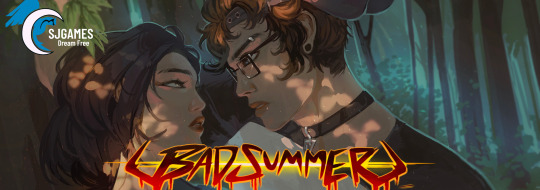
Hey, everyone! If you have been eagerly awaiting a new gaming experience that will transport you to new dimensions of romance and horror, then search no further. "Bad Summer" is a captivating journey that promises to immerse you in a hauntingly beautiful narrative, filled with twists, turns, and unexpected encounters. We can't wait to introduce you to "Bad Summer," our upcoming visual novel and analog horror experience!
"Bad Summer" weaves a chilling tale in the form of a dark visual novel, blending elements of horror, mystery, and romance to create an eerie tapestry of the unknown. Play as Jenny, a teenage camp counselor fighting for her life as a deadly creature of unknown origins stalks her every move. Can you survive the dangers of Camp Bear Ridge summer camp and find love along the way?
Our visual novel has unique point-and-click adventure elements. Interact with objects and use/manage your inventory well to discover hidden lore and solve puzzles. Found a key in an inconspicuous location? Take it with you! Might be useful for later. Items stored in your backpack will help you progress through the game. Take it everywhere you go. Never know when you might need it.

Unlike normal point-and-click adventure games, "Bad Summer" has a big emphasis on romance. Our horror elements are inspired by successful visual novels such as The Letter and Doki Doki Literature Club. Our romance took inspiration from k-dramas, TV shows, and steamy best-selling fiction novels. Our storyline was also heavily inspired by interactive drama video games such as The Quarry and Halloween movies starring Jason Voorhees.
Expect jump scares, blood, gore, death, and analog horror sequences.
Although horror and unsettling themes is the primary focus in Bad Summer, this is a narrative-heavy game with choices, consequences, and multiple endings. Your decisions can either save lives or end them. The stakes are high in Bad Summer and you will find yourself constantly questioning who to trust.
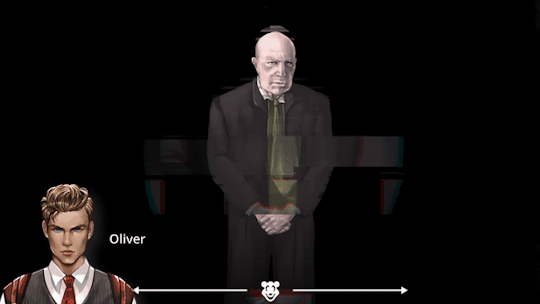
Romance is a critical part of "Bad Summer", but we didn’t want our game to feel like an average dating simulator. Instead, when pursing a romantic interest in this game, there is no “right” or “wrong” choices. Converse with your love interest however you choose. Take a timid approach, speak with them from the heart, boldly make your advances, or shy away if you want to.
You won’t need to choose the right answers to romance a character in this game. No need for a guide or silly mini-games. Be yourself and you’ll find love regardless. You deserve it.
But you can only romance one and you’ll be locked in early in the game. (There will be a notification before you make the choice, don’t worry.) Choose wisely. Your life might depend on it.
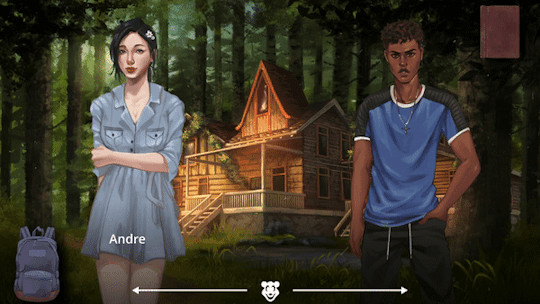
Warning!
"Bad Summer" is rated 18+ and is intended for a mature audience. This game includes violence, blood and gore, sexual themes, strong language, and discussions of death, grief, and depression. Jump scares too. Horror and distressing depictions go hand-in-hand. It is a core element of our game, and is not suitable for children. You’ve been warned.
Interested? Follow us for more updates, teasers, and cool spooky stuff! Also, check out our website for more details! 🔥
#badsummer game#dating sim#indie game dev#indie games#visual novel#art#gaming#horror games#romance#cute#otome game#indie visual novel#artwork#pc games#original art#new game!#don't miss out#hot girl summer#im so excited#to show you guys this game#be on the lookout#gonna be fire 🔥
41 notes
·
View notes
Text
Alright! An update!
For those who are following my Patreon, I know I said I’d release it on the first of this month but uhhh… Yeah, thing kinda got a bit out of hand. More importantly, the scene where you burn Harag’s “house.” You can fully skip it but it’s 9K (Might go to 12-13K as I said, getting outta hand). You’ll also find a lot of things so I suggest you don’t, but then again, I’m giving you so many options because I want your options to matter. Whether it’s burning down someone’s house, or choosing just how loving you want to be towards your rift walkers.
Now, onto the updates!
First off, I just want to thank all my Patreons and Ko-fi (I know there aren't any yet but thank you all future supporters! <3). They’ve been a massive motivation and I may have had an emotional breakdown this week over “OHMIGOSH PEOPLE ARE STILL SUPPORTING ME ” So haha, yeah. Thanks, everyone. You guys are awesome <3 I might also hold a poll there to choose a short story so yeah!
The game is at 44K (Yep, you heard that right. That’s almost 9K words from last week >:3) I’m gonna try to push myself really hard this week because on the 10th or 11th I’m gonna have to go camp at my professor’s house so he doesn’t send us on an unpaid internship. (A lot of reasons for me doing that, but first and foremost would be that I already left my previous job hence why I’m able to write 9K a week, but also cause It’s unpaid and a 9-10/11 job instead of a 9-5 (cause of me learning and such) along with other subjects in Uni, and then tutoring kids as well, it just leaves me no time to spend on the book, even if I pull all-nighters like I used to.). Dunno how long it’ll take for that but I won’t be alone so yeah, I am going to push really hard to release a Patreon version on the 8th or 9th (Imma try to release it on Friday or Saturday but I want this to be as perfec and enjoyable). (I think I might be oversharing, do tell me if I am;-; )
I’m just gonna leave this here cause I’m having way too much fun with the game.
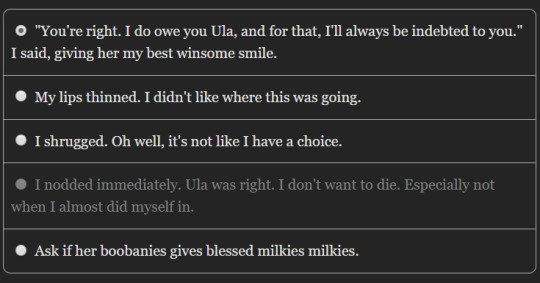
Three heartfelt moments with Thor and two with Laurel, you can now extort a femboy from Harag (I was thinking of having you send Laurel to extort a femboy from a 12-year-old and also beat him up and take his money cause that’s literally what Pokemon was lmao but then I thought “Hey! This is even better!” As such, you can punch Harag where it hurts the most… well, not between his legs, but you’ll get the time to do that later.
A lot of world-building was done… and by a lot, I mean I referenced to like, 4 or 5 things BUT HEY! PROGRESS IS PROGRESS >:c
Annnddd that’s all folks! Thanks for coming to my TED talk, have an amazing weekday! Remember to sleep well, eat well, and drink well! (Cause I don’t lmao) Love ya’ll
#femboy dating adventure#choice script#choice of games#armored femboy#femboy dating simulator#hosted games#if#interactivefiction#interactive fiction
13 notes
·
View notes
Text
OUR LITTLE GAyMES
Were a group of Brazilian friends who have been making some cool indie games. For now, it's mostly from game jams, but we're working on some big projects! Here are them:
OverClouds
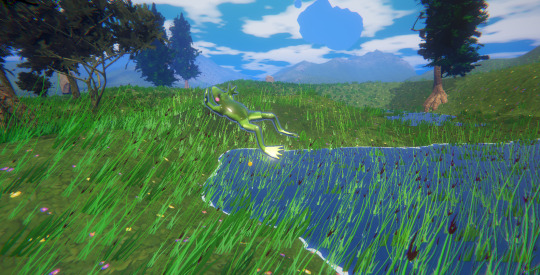
A simulation and adventure game where you take photos and catalog the wildlife that inhabits these mysterious floating islands. Under development.
Hivemind
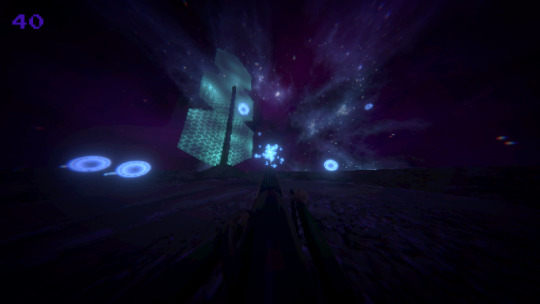
A boomer-shooter where you need to protect your space boat from alien jellyfish. Made in a seven-day game jam.
Pit & Ty
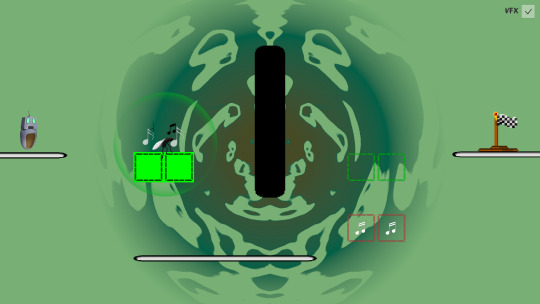
A two-person local co-op platform where a musical fly helps a robot pass through an invisible path? Idk kinda random. Made in a weekend game jam.
Abaugi

An interactive horror fiction, you explore a small neighborhood after your car breaks down in the middle of the road. Made in a five-day game jam.
10 notes
·
View notes
Text

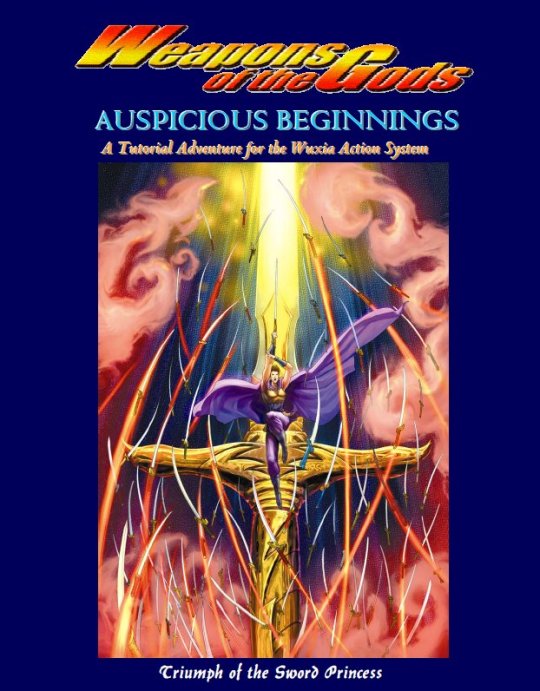
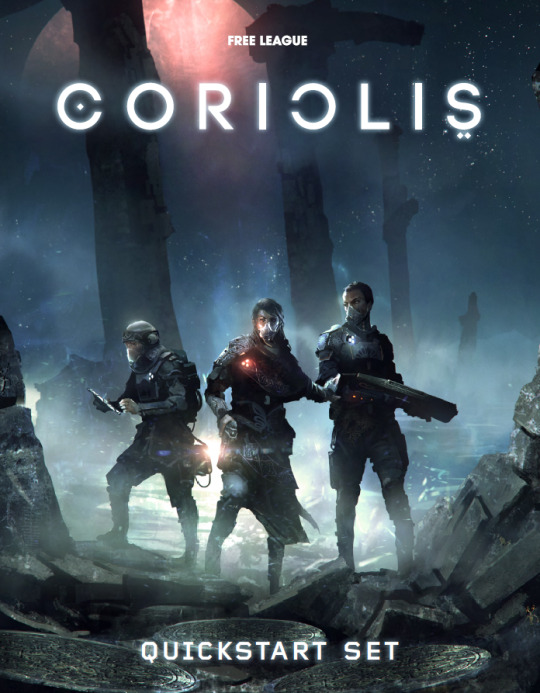
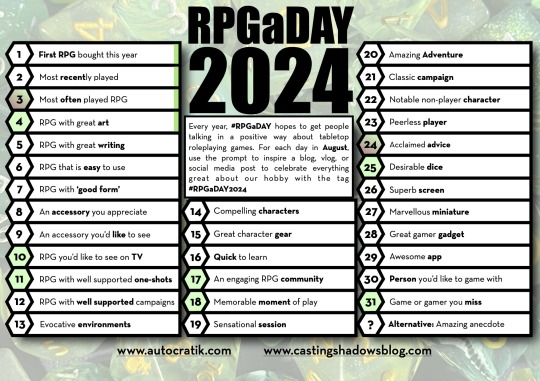
#RPGaDay2024
Amazing Adventure
One of the most challenging things for game designers is offering a solid, easy to get into, slowly building, and comprehensive starter adventure. Back of the core book ones have the additional pressure of being there forever. I’ve seen some that have become classics– which many people can bond over. Isle of Dread for Expert D&D back in the day was one of these. I’ve also seen ones that aren’t great– with broken rules references, dropping in too many systems, railroading, or focusing too narrowly.
The original Coriolis quickstart adventure which came out before the game had some of these problems. It listed several things on the character sheets which weren’t in the rules presented. But more importantly it offered a sci-fi bug hunt scenario which a) was boring and b) did absolutely nothing to sell the actual setting. The earliest Modiphius Conan 2d20 qs adventure, despite being based on a Howard story, was insanely boring: basically a series of linear fights, no social interactions, little other skill use, and almost no choices on the players’ part.
But there’s one intro adventure which I love. I’m recycling from an #RPGaDay prompt from back in 2015, but my answer still holds: Auspicious Beginnings.
What is it? A tutorial adventure for Weapons of the Gods, the wild wuxia system. WotG is, IMHO, a hot mess but I love the vibe of it. There are legendary stories, tales of factions, explanations of philosophies, discussions of gender, and descriptions of nations throughout the book. They contain a mix of fiction and description.
But more importantly players can buy connections to those ideas and stories. You can purchase a link and become part of these fables- creating a destiny, showing the GM what you want, and encouraging you to play within those archetypal elements. It’s cool and something worth stealing for other games.
But I had a hard time following the system beyond that. It uses the kind of dice tricks I’m not fond of- pattern matching and the ability to flow dice out of your pool to the side and then back again later. Fireborn and some other games have done that and "it's not my bag." (tm) And the combat’s super involved, though I suspect it does simulate the feel of a legendary encounter.
But forget all that. Ignore what I just said, because Auspicious Beginnings is wonderful.
The PCs heroes arrive at Only Two Devils, a frontier city with a reputation for the exotic. The city has several striking key NPCs and factions associated with them (like Ironhand Nan and the Sheathed-Blade Empty-Hand Prosperity Society). The Governor has elaborate rituals for city entry and stiff requirements to access the more interesting spots. One or more members of the group need to get to the secret markets to secure a special lost item. To do so, they need a sponsor. Therefore they have to participate in a grand contest- not of fighting, but tests of skill. Like leaping from spear point to spear point carrying a flag while avoiding arrow fire. If the group can succeed, they’re adopted by one of the factions- which leads to a fight and a jump off for further adventures.
The contest’s brilliant and colorful. It’s intended to showcase and ramp up the use of the game mechanics. That holds true for other systems besides WotG. You can use this as a model to show how to do cool stuff. The characters are awesome- the Pre-Gen PCs, the rival contestants, the leaders of the faction. The setting’s vivid and full of amazing hooks. It has twists, ways to buy into the setting, and great advice for running any Wuxia game.
I’ve used this set up straight or in modified form about a half dozen times. I’ve come up with all kinds of crazy new contests. My favorite is racing hungry monkeys to gather fruit from a private garden. There’s a ton of inspiration here and it’s fun to come up with new ones tuned to the players’ builds. Use Auspicious Beginnings for any fantasy game with stunting concepts and athletic tricks for the players (like Exalted or Hearts of Wulin).
2 notes
·
View notes
Text
Reflection on Sword Art Online
I've watched "Sword Art Online" before and initially thought it was just a relaxing and interesting anime, nothing too profound. However, everything changed when I decided to rewatch it. This time, armed with a bit more knowledge about Jean Baudrillard's "Simulacra and Simulation," I realized how deeply the themes of the show resonated with his ideas about the blending of reality and simulation.

The series, which immerses its characters into a life-or-death virtual reality game, perfectly encapsulates the concept of simulacra, where simulations become indistinguishable from reality. Watching it while simultaneously engaging in an online course where my virtual interactions were significant and impactful, I couldn't help but draw parallels between my life and the show. The virtual classroom, much like the game in SAO, had become a pivotal part of my daily reality, making me question the very nature of what it means to 'experience' something.

This rewatch, enriched by my online learning, made me appreciate how SAO explores the impact of technology on our perception of reality. It's not just about the thrilling adventures within a fictional game; it's a commentary on our evolving digital lives. It made me reflect on how online interactions, learning, and digital communities are increasingly becoming as real as their physical counterparts.
It's fascinating, and a bit unsettling, to realize how an anime I once viewed as mere entertainment now serves as a profound narrative echoing my academic explorations. This deeper connection has sparked introspective thoughts about my own digital habits and the blurred lines between virtual and physical realities.

3 notes
·
View notes
Text
My brand new introduction!!

Hi, my name is Misa. Misa as in like a god, the french meaning of the name I'm pretty sure.
Im 15 years old, I'm a Pisces, I'm autistic and I have adhd. My religion is paganism, and my favorite colors are pastels but I prefer pink. I'm also biracial, I'm half white and half black.
I'm very much interested in Japanese fashion like fairy kei, visual kei, gyaru, gurokawa, idk if this also counts but pastel goth. And Yamikawaii.
I'd say my favorite videogames are fnaf, I used to like yandere simulator but I don't anymore because of yandere Dev. I hate Yandere Dev. I also like Minecraft but the developer notch is a game dev from absolute hell. I also love any of the shin megami tensei games. I love any vocaloid videogame. I also love the game obey me shall we date, doki doki literature club, genshin impact, and sky. Some videogames I do wanna play is Diabolik lovers, hello kitty island adventure, bendy and the ink machine, style savvy, Stray, iron lung, and class of '09.
My favorite bands are the cure, depache mode, my chemical romance, pierce the veil, black veil brides, falling in reverse, twenty one pilots, fall out boy, Babymetal, bandmaid, Malice Mizer, Paramore, Cannibal corpse, and get scared. I don't really pay attention to band members so don't call me a fake fan. I just listen to the music.
By the way. I also love kpop. My favorite groups are bts, blackpink, new jeans, itzy, gidle, red velvet, nct and twice.
My favorite artists is Melanie Martinez, Tyler the creator, and Hatsune Miku.
I also love a ton of anime and manga as well as video games. I also love food too. It may change a lot depending on my mood.

I'm gonna keep my dni list short and simple. If you use my tag hauntedkogal without my permission. That's an instant block.
If you give out movie spoilers, anime and manga spoilers or video games spoilers that's also an instant block. No one likes people who spoil stuff for them 💀.
Also besides that, here is my dni list. I don't want people who post irl gore, porn even if it's fictional, fetish accounts specifically. People who use self harm and post about that isn't just cutting but includes an eating disorder if it's not venting or people who trauma dump as well. And last but not least. People who are pedophiles, into incest, shame people for their sexuality and religion but get mad when theirs gets insulted back, people who proship, comship, and darkship come on my page and people who are abelist interacting with my content. I also don't want racists coming on this blog because this is a fashion, and cutesy blog where I post whatever I want. I'm all for free speech but take it somewhere else, not in my messages, and not in my comments section. I have boundaries. Then again it's the Internet. Most people would not gaf about what I said. But the point of my dni list is that I don't want weird people interacting with me.

If you have any questions please let me know! Also. Don't be sexualizing me, being racist or plain up creepy if you message me thank you very much!

#hauntedkogal#introductory post#introducing myself#introducción#explorepage#tumblr#actually autistic#actually adhd
7 notes
·
View notes
Text
BEYOND THE TABLE: REALITY, THE SECONDARY WORLD, AND THE ROLE OF THE DUNGEON MASTER
~~~~~~~~~~~~~~~~~~~~~~~~~~~~~~~~~~~~~~~~~~~~~~~~~~~~~~~~~~~~~
DEFINITIONS
(Primary) Reality – whatever this is, just read some metaphysics or some shit
The Secondary World – the Other Realm, the place beyond Primary Reality bridged by Imagination
The Table – Imagination; the veil of play-space wherein the Secondary World makes contact with Primary Reality
Campaign – an excursion into the Secondary World via Imagination, obfuscated from Primary Reality by the friction between Gameplay, Simulation, and Narrative
adjudication – the process of mitigating friction between Gameplay, Simulation, and Narrative
~~~~~~~~~~~~~~~~~~~~~~~~~~~~~~~~~~~~~~~~~~~~~~~~~~~~~~~~~~~~
My most recent ex all but annihilated me last October with the contents of an amicable text message. Over the previous few months, we’d been slowly repairing our communication enough to plan cat-care responsibilities. By all accounts, it should have been a completely normal interaction following a breakup just finding its footing: she had unearthed index cards encoded with statistics for magic items her character acquired in my since-canceled campaign from among her effects and buried the small-bore offer of their return for my records under discussion of scheduling time for me to see Mr. Kitty.
I fell apart.
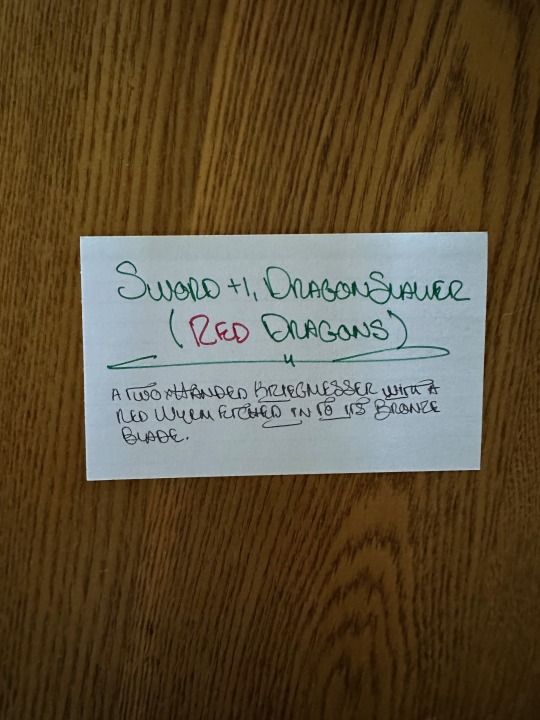

Background
The fantasy adventure campaign the cards originated from was easily the most ambitious – and quite possibly most successful – design of any game I’ve constructed in my near-15 years of facilitating TTRPGs: what started as a weekly Thursday meetup running dungeon crawls by the book for some co-workers quickly became a West Marches game with a roster 12–14 players deep across 2 regular play-groups using a hacked-up mish-mash system I built on the fly week-by-week. The scale was magnificent to behold, our hex map slowly blossoming as the players peeled at petals to see what the flower of this mythic land looked like inside. Nearing a year removed from those adventures, I am proud of what we accomplished to this day.
Session was an opportunity to run from the deep problems festering in my relationship; I had just moved into my partner's run-down, dream project home with her & absconded from any deeper thinking about the friction that had been building over the previous year, instead fixating on clear records of narrative timelines, dungeon excursions, side-quests, character relationships, and world events. When I made time for (free) labor around our changing living space, I permitted resentment to simmer: that my passion – being the best facilitator of this emergent fiction I could – was secondary to the dreams of my property-owning partner. When I surprised her with completed projects from her list around the house while she was away, anything less than her utter amazement left a bitter taste in my mouth. I let slip passive-aggressive moans at never having time for the prep work that made me happy, lacking the insight to realize the game was a shield against the loneliness I felt in my relationship.
This was also my then-partner’s third Campaign of mine played in 2 ½ years. A stand out from the start, she rarely took time to understand the game outside of session for her natural ability to process mechanics and draw narrative details from thin air; creative writing and an overachieving academic streak gave her a leg up when attuning to the role she played in the group’s function. Piloting a campy, edge-adjacent build played with deadly seriousness, she worked from the shadows to accomplish her goals, maneuvering the roster’s characters as means to her ends. I was proud of her for this, the scheming and the side-quests and the subtlety, because she was playing the game and well. I could never get over the gnawing feeling that participating in the Campaign wasn’t her desire, though, but that a sense of duty absent of passion for my interests brought her to the Table; like she felt that playing was important because it was my game, and not because she was having a good time. I could never tell if she was having a good time.
When my partner and I separated last April, I disbanded the company of cordial comrades who attentively arrived to each session, oathsworn that our jaunts through The County of Blunderburry in Esterdale would continue at another time; The Secondary World moved and changed even when our minds’ eyes were occupied, I insisted, and each future visit was a promise of new ideas, of change. It wasn’t until months later that I let on to some of the game-regulars the real reason why I called our grand adventure off, well after I had found temporarily stable ground post-life-collapsing-around-me.
Judgment
In the fallout of the breakup and upkeep of coordinating kitty care, I had completely forgotten that she had the cards, physical cues marking her in-game possession of the artifacts statted on them. Rather than answering the inconsequential question raised for me of the cards’ fate, I fell headlong into debilitating anxiety catalyzed by months of emotional turmoil, seeing past the oversight in my facilitation to the now-painful memories of hours spent at the table reaching into the Secondary World with her. My binder stuffed with dog-eared notes chronicling the escapades of the roster had gone untouched in months for the same reason; confronting the hurt inside those records of her achievements in my game was something I was not ready to bear.
I agonized over the “right” answer to her offer, begging myself to conjure something satisfactory to my principles. The way I understood the scenario, there were 2 outcomes:
• I take the cards
• She keeps the cards
These outcomes were further layered by the intentions associated with the choice:
• I take the cards...
… because they are sentimental to me … because unique items should not have duplicates … because I did not want her to throw them out
• She keeps the cards...
… because I want her to deal with them … because their existence is painful to me … because… because…
I had very little to lose, and I knew it: the items’ information – two magic swords with dragon-slaying enchantments – had been recorded in my binder upon their looting, reducing any stakes of the outcome to whether it would keep me up at night. People-pleasing tendencies reared reliably thrashing maws at my principles, insisting through self-sabotage that my only priority was to act without spite or resentment. I was frozen by this weightless decision resting on my dignity.
So I hit the copium: rather than address this unsettling quandary as the most authentic version of myself, I reached into the depths of my Imaginary Costume Chest and procured the garb of the Dungeon Master. What would the ideal facilitator do? How would they deliberate over such a low-stakes scenario, charged as it was with emotionality? I quickly found my answer and transformed through its adjudication.
Experience dictates that enlightenment is not a once-and-for-all type deal, Siddhartha wasting away under the fig tree until perfection, weary from resistance, unravels forever. Rather, it is a series of accumulations, moments that shriek across the sky of inner sight, arriving unexpectedly and leaving as soon as you look away. In that moment, seeing through the eyes of the Dungeon Master, the Secondary World was there. The Table rose before me, and from ego-differed I saw what was due: that the fate of the cards should be decided by the player of the character possessing them, regardless of personal desire for the physical symbols. The player-character position of possession is weighty in classical adventure games; treasure is a promise of the play-style, the payout for characters bought into designs of Dungeons, Demi-Hells, and Derelicht Halls. The Truth of the Secondary World hinged on this adjudication: that – no matter what interpretation of the items’ possession I could enforce in later chronicles – the fate of their simulacrum in Reality must be decided by the equivalent representative of their possessor in the Other Realm. Any other choice was a dishonest attempt to twist the Secondary World around my selfish desire for power in Primary Reality.
Erudition
Who gives a shit, though, right? So much emotional effort spent just to decide the fate of some dingy 2x3 index cards pedantically recorded months before. Even still, I returned to the decision again and again, feeling a familiar truth that had evaded my comprehension for more than a decade of facilitation finally coming into focus. In therapy sessions following the breakup, I had confided doubts of my motivations for running games amidst shifting insecurities and self-loathing: that I used table time not as a thought-experiment I longed to leverage against those weaker parts of myself but as abolition of my responsibility to Primary Reality, to my obligations and concerns of a better life for myself and those around me. I doubted my practice, this steadfast duty to my happiness, in fear that it caused the crumbling of my relationship, rather than the tension and mistrust obviously sign-posted in shrinking gaps the farther down the road our time together traveled.
Cloaked in adjudication, I found sublimity. I was free from expectations of self-importance and righteous grandiosity, unshackled from my self-imposed totalitarian responsibility to be anything other than a conduit for the Truth of the Secondary World. My weakness was leveraged against the fulcrum of objective judgement. Removing my ego from the equation, I found peace in the Dungeon Master’s decision.
This epiphany is my remaking, an affirmation of my long-held belief in the practice of officiating the movements of the Secondary World; when we gaze into the Other Realm to see what could be, we are afforded the grace to think beyond our compromised persona in Reality to the idealization of our selves. The Dungeon Master’s thankless role is to give what is due the actions of those who brave the dangerous truths inside the Secondary World, moving and changing as it is even when our minds’ eyes are occupied; becoming this conduit, the Dungeon Master is anointed in acceptance of the truths they must bear. For me, just this is it: the idealization of my highest self is purest acceptance, and each orracular excursion across the Table and into the Beyond is an exercise in that action. With hope, I gaze into wonder and oblivion, knowing that the Secondary World is only just outside the scope of reality by the width of a dreamspan.
I sent her a reply with thanks for the consideration. In the post-apocalypse of my anxious breakdown, I coincidentally put my current game on hiatus for the season; sabbatical was spent compulsively plumbing the depths of myself for changes the Dungeon Master has imparted to me with years of practice. Any ttrpg player with some experience can describe at least one moment when the line between themselves and their character blur, the bounds between the Primary self and the soul on the Table becoming too small to sense. These event horizons eclipse the light of our egos, and in the cold shadow we learn where our silhouette overlaps with our characters’. Is the Dungeon Master a projection of my inner landscape, disappearing with ego death? An archetype of acceptance to aspire to, standing parallel to me in the shadow? Only a lifetime can tell.
6 notes
·
View notes